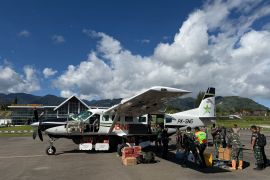The Indonesia Property Watch appreciated the policies that liberalized the property market such as with the instrument of Real Estate Investment Trust (DIRE).
In many other countries, DIRE has become an important instrument as a source of cheap public funds, Executive Director of Indonesia Property Watch Ali Tranghanda said.
In Malaysia, instrument like DIRE has succeeded in raising fund up to Rp100 trillion from market capitalization, Ali cited.
The success is even more spectacular in Singapore where such instrument has raised up to Rp600 trillion or 19 percent of the local market capitalization.
"In Indonesia , DIRE funds have so far reached only Rp500 billion. It is very small in the countrys highly potential property market of the country," he said.
Ali, however, is optimistic with the availability of the DIRE instrument that Indonesia would soon catch up with even overtake Malaysia in the size of property market.
The introduction of the DIRE instrument is momentous for the revival of the countrys property market, giving a stimulus to local developers.
The bank lending rate of 12-13 percent per year is too high in the country, prompting local developers to seek loans in U.S. dollar denomination with much lower interest rates of 2-3 percent.
Ali said cheap funds of DIRE would make the countrys real estate developers more competitive in the regional free trade scheme of ASEAN Economic Community.
He said lower Bank Indonesias benchmark interest rate (BI rate) should trigger a cut in housing credit (KPR) interest rate to boost the property sector in the country.
"The recent cut in BI rate to 7 percent from 7.25 percent, should result in KPR interest rate," he has said.
He said every cut of one percentage point in KPR interest rate would increase the KPR market potential by 4-5 percent.
The cut in BI rate to 7 percent from 7.5 several months earlier could result in the decline in KPT interest rate to one digit, he said.
"Currently the bank lending rates are generally two digits.If the KPR interest rate could be slashed to one digit, the KPR market could increase by 10-25 percent," he said.
Meanwhile, PT PP Properti Tbk, a publicly traded subsidiary of state-owned construction company PT Pembangunan Perumahan Tbk, said the cut in the BI rate to 7 percent at present could jolt into life business in the property sector in the country.
"The cut in the BI rate and relaxation policy in Housing Financing Liquidity Facility (FLPP) is a positive step for the national property industry," PP Properti president director Taufik Hidayat said early this week.
PT PP Properti sets income target at Ro1.81 trillion in 2016 or an increase of 20 percent from Rp1.51 trillion in 2015, he said.
"We will carry out mega projects in 2016," he said, adding that he was optimistic the company would chalk up Rp360.39 billion in net profit , up from Rp300.33 billion in 2015.
Meanwhile, the investment marketing team of the Capital Investment Coordinating Board (BKPM) said a big Saudi company group is keen on investing in the property and industrial sectors in Indonesia.
BKPM chief Franky Sibarani said the Saudi company, the fifth largest comoany in that country, plans to visit the country to study the investment plan this month.
"They want to know all details about investment procedure, banking system and availability of manpower," Franky said.
"A research by the Indonesia Property Watch said that property sales in the last quarter of 2015 in the Greater Jakarta area and Banten grew 16.6 percent from the previous quarter," Ali Tranghanda said.
He said the relatively strong growth, however, may not last long but at least it signaled positive trend especially in the house sales.
He said the sales in the last quarter of 2015 were still below or 10.87 percent lower than the level recorded in the same period in the previous year.(*)
Reporter: Muhammad Razi Rahman
Editor: Heru Purwanto
Copyright © ANTARA 2016











